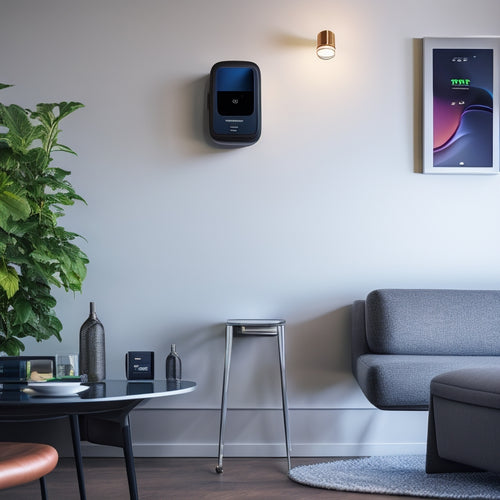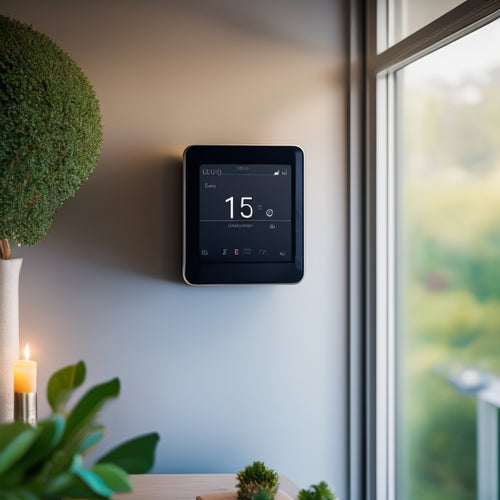
What Are Commercial Vehicle Solar Panel Installation Costs?
Share
Your commercial vehicle solar panel installation costs will depend on several key factors, including the size and type of your vehicle, the quality and efficiency of the solar panels, and the complexity of the installation process. Average installation prices range from $2,000 to $10,000 or more, depending on system size and panel efficiency. Labor and material costs add to the total bill, with labor costs ranging from $2,000 to $5,000 and material costs adding $3,000 to $6,000. To get a better understanding of your specific installation costs and potential long-term savings, consider the nuances of your vehicle and energy needs.
Key Takeaways
• Commercial vehicle solar panel installation costs range from $2,000 to $10,000 or more, depending on system size and panel efficiency.
• The type of commercial vehicle, such as trucks or buses, impacts total installation cost due to varying requirements for harsh conditions, electrical systems, and temperature stability.
• Labor costs for installation range from $2,000 to $5,000, while material costs add $3,000 to $6,000 to the total bill, depending on complexity and panel quality.
• Site assessment and permit requirements affect installation costs, with non-compliance leading to costly rework or safety hazards.
• Despite high upfront costs, solar panel installation leads to significant long-term savings and ROI through reduced fuel consumption, maintenance costs, and improved fuel efficiency.
Determining Installation Costs Factors
When calculating the cost of installing solar panels on your commercial vehicle, you need to take into account several key factors that can greatly impact the overall installation cost. A thorough site assessment is vital in determining the feasibility of the installation. This assessment involves evaluating the vehicle's roof size, orientation, and shading conditions to determine the best solar panel configuration.
Additionally, permit requirements must be considered, as these can vary by region and jurisdiction. Obtaining the necessary permits can add to the overall cost, so it's important to factor these in from the outset. Failure to comply with permit requirements can result in costly rework or even safety hazards.
Average Solar Panel Installation Prices
With a clear understanding of the factors affecting installation costs, you can now consider the average prices for solar panel installations on commercial vehicles, which range from $2,000 to $10,000 or more, depending on the system size and quality.
Here's a breakdown of the average installation prices based on system size and panel efficiency:
| System Size (Watts) | Panel Efficiency (%) | Average Installation Price (USD) |
|---|---|---|
| 1,000 - 2,000 | 15-18% | $2,000 - $4,000 |
| 2,000 - 4,000 | 18-20% | $4,000 - $7,000 |
| 4,000 - 6,000 | 20-22% | $7,000 - $10,000 |
As you can see, the prices vary considerably based on the system size and panel efficiency. Higher-efficiency panels generally result in higher energy output, but also come at a higher cost. When considering a solar panel installation for your commercial vehicle, it's important to balance your energy needs with your budget. By understanding the average prices and factors affecting installation costs, you can make an informed decision that meets your energy requirements while ensuring safety and efficiency.
Costs of Commercial Vehicle Types
Your commercial vehicle type greatly influences the total installation cost, as different vehicles have unique requirements and constraints that affect the solar panel system's design and implementation. For instance, truck fleets often require customized solar panel systems that can withstand harsh weather conditions and vibrations, which can increase the installation cost.
On the other hand, bus conversions may require more complex electrical systems to support the added power load, resulting in higher installation costs.
The type of commercial vehicle you have will also impact the installation cost. For example, refrigerated trucks may require additional components to maintain a stable temperature, increasing the overall cost. Moreover, the size and weight of the vehicle can affect the type and number of solar panels needed, which can influence the installation cost.
When considering commercial vehicle solar panel installation, it's essential to factor in the specific requirements of your vehicle type. By understanding the unique needs of your vehicle, you can better plan and budget for the installation process, ensuring a safe and efficient solar panel system.
Installation Labor and Material Costs
To guarantee a successful installation, it's crucial to budget for installation labor and material costs, which can make up a significant portion of the total installation expense. These costs can vary depending on various factors, such as the complexity of the installation, panel quality, and wiring complexity.
For example, high-efficiency panels with advanced technology may be more costly than standard panels. Moreover, installations that require custom wiring or complex electrical connections will necessitate more labor hours, thereby increasing the overall cost.
On average, installation labor costs can range from $2,000 to $5,000, depending on the complexity of the installation and the installer's experience. Material costs, which include the panels, mounting hardware, and electrical components, can add another $3,000 to $6,000 to the total bill.
It's important to collaborate with a reputable installer who can provide a detailed breakdown of the costs involved and ensure a safe and efficient installation. Make sure to inquire about the quality of the panels, wiring complexity, and any additional features that could impact the overall cost.
Long-Term Savings and ROI Analysis
After investing in a commercial vehicle solar panel installation, you can expect significant long-term savings and a substantial return on investment (ROI) due to reduced fuel consumption and lower maintenance costs. One of the primary benefits of solar-powered vehicles is improved fuel efficiency, which leads to reduced fuel costs over time. According to industry estimates, a well-designed solar panel installation can increase fuel efficiency by up to 20%, resulting in significant cost savings.
In addition to fuel savings, solar panels also reduce maintenance costs by decreasing the load on your vehicle's engine and reducing wear and tear on moving parts. This means you'll spend less on repairs and maintenance over the lifespan of your vehicle, further increasing your ROI.
Frequently Asked Questions
Can I Install Solar Panels on a Leased Commercial Vehicle?
Before installing solar panels on a leased commercial vehicle, it's important to carefully review your lease agreement for any restrictions on modifications. Make sure to obtain permission from the lessor, as you don't own the vehicle, and alterations might violate the lease terms.
Do Solar Panels Affect the Vehicle's Warranty or Insurance?
When you install solar panels on your commercial vehicle, you're probably wondering if it'll void the warranty or impact insurance claims. Rest assured, most manufacturers won't cancel your warranty, but it's crucial to check their policy and review insurance claims procedures.
Can Solar Panels Be Installed on Refrigerated or Frozen Food Trucks?
You can install solar panels on refrigerated or frozen food trucks, ensuring the cold chain remains intact while maintaining food safety; however, it's important to consult with manufacturers and regulatory bodies to confirm compliance with specific regulations.
Are There Any Government Incentives for Commercial Vehicle Solar Panels?
Like a ray of sunshine illuminating your path, government incentives brighten up your solar panel investment. You can tap into Tax Credits, Renewable Grants, and other programs to offset costs, making your commercial vehicle solar panel installation a more viable option.
Can I Install Solar Panels on a Vehicle With a Curved or Irregular Roof?
When you're dealing with a curved or irregular roof, you'll face Roof Complications, but don't worry, there are Solar Workarounds. You can use adjustable brackets or custom mounts to securely install solar panels, ensuring a safe and efficient energy-harvesting solution.
Related Posts
-

7 Best EV Battery Health Trackers for Homeowners
You can maximize your electric vehicle's performance and lifespan by leveraging advanced battery health trackers that...
-

Smart Energy: Greener Homes With Connected Power Devices
You can control and optimize your energy consumption with smart energy devices, reducing your carbon footprint by up ...
-

10 Green Waste Solutions Every Homeowner Should Know
You can make a significant impact on the environment by implementing green waste solutions at home. Consider composti...


